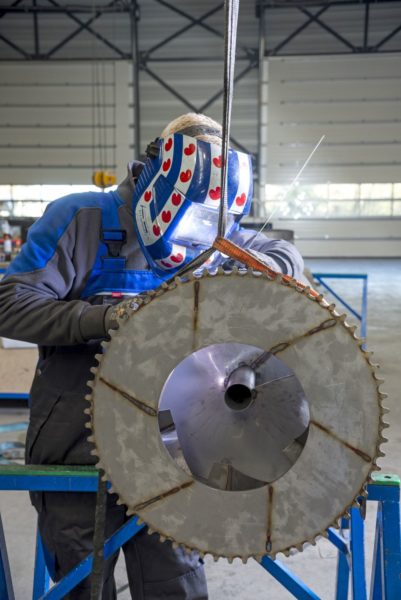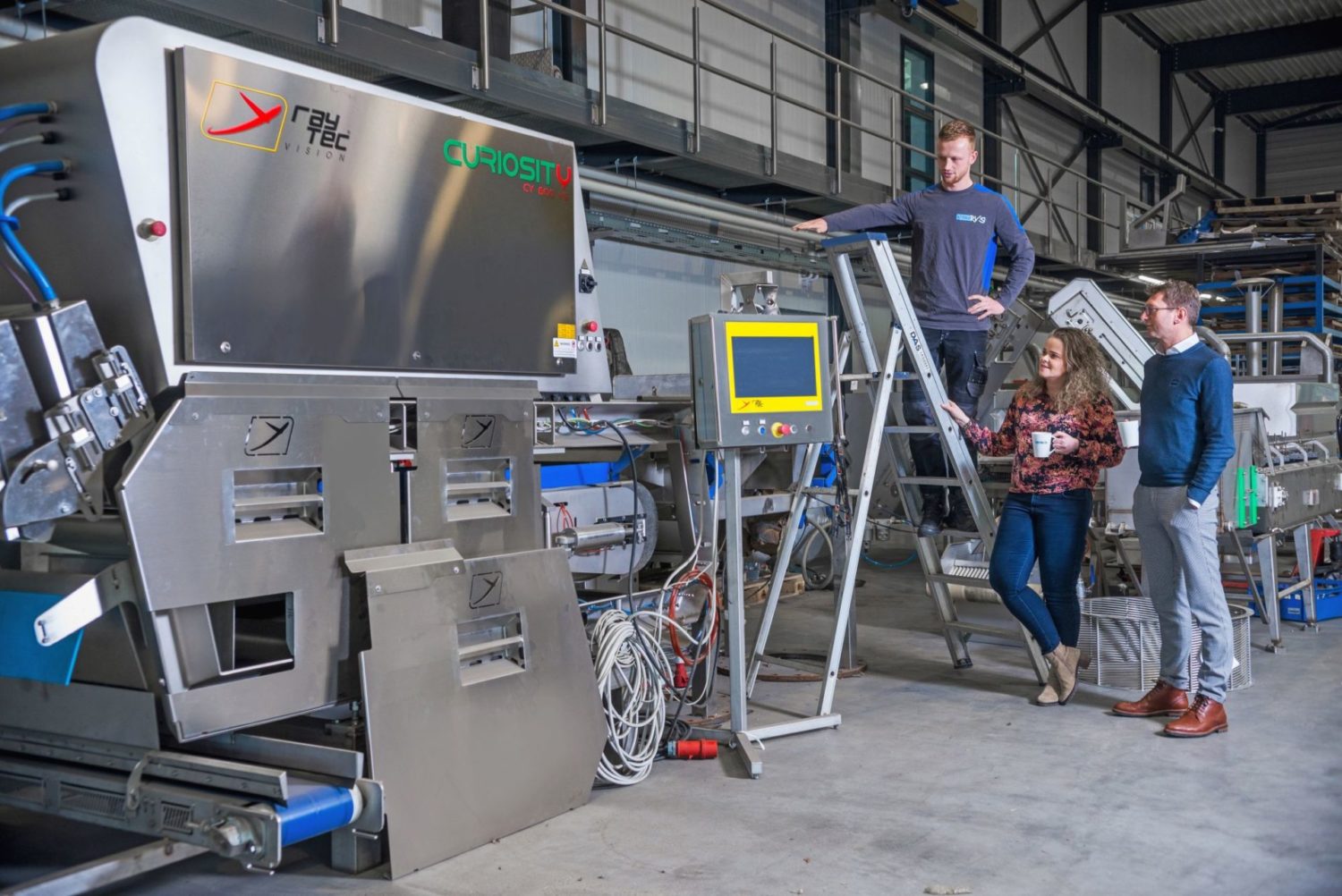At De Boer RVS in Makkum they make - in their own words - "the machines that make the difference. The Frisian company is the market leader when it comes to sustainable, completely customized production lines for fishing vessels. Specialist in shrimp processing on the high seas.
Clearly a profession in its own right, because the complete stainless steel "shrimp factory" including transport lines, sorting points and cooking kettles must fit within the limited space on board a ship and all parts must be able to withstand seawater. Shrimp fishermen can count on solid equipment that is energy-efficient, safe, low-maintenance and easy to clean. Everything revolves around the efficient, fast, environmentally conscious and profitable landing of as many shrimp as possible in top condition. This means: nice and fresh and 'with a nice curve'.
Gerben de Boer, son of owner Melle de Boer, gives a tour of the assembly hall. He is 22 and a work planner in the company. Father Melle: 'He does have a talent for it, both technically and in his contacts with people. The experience will come naturally.' At De Boer RVS they accompany a customer from start to finish. From assembling the complete production line, including rinsing mill, shaker, sorting sieve, catch basins, cooking kettle and cooling machine to the assembly, the expert installation of the street on board.
Shrimp sorting always worked something like this: in the walls of a wide, rotating drum, which looks a bit like a washing machine drum, there are small holes everywhere. With a diameter of 14 or 16 mm, the average size of an adult Dutch shrimp. Good to know: De Boer RVS mainly works for the fishermen in the shrimp capitals Urk, Harlingen, Zoutkamp and Wieringen, further Germany and Denmark. We are not talking about exotic knots of shrimp or prawns. What we didn't know: our shrimp are pre-cooked right at sea and then cooled to promote quality.
Sustainable development
The pride of De Boer RVS is its own invention: the optical sorter. It works with a camera system from Italy. At De Boer they built a well functioning shrimp sorter around it. The fished shrimp lie patiently waiting on a vibrating belt, together with the inevitable bycatch. The camera's eye unerringly recognizes anything unfit for a shrimp fisherman: small fish, undersized shrimp, anything that is not a shrimp. A puff of compressed air flicks the bycatch off the belt, it falls neatly into a tub of water and can be thrown overboard immediately. Alive and well! Melle de Boer: 'Normally this was done with a rotating drum; that is much less precise. Some of the bycatch is then accidentally processed and then thrown overboard dead. Obviously, that's not very sustainable.'
'Little dirty bugs'
Meanwhile, innovations do not stand still. New from the thinking laboratory of De Boer RVS: a self-developed larvae breeding plant. That sounds surprising but, according to Melle de Boer, there is a clear link with shrimps: 'This too involves dirty little creatures. Because to be honest, I have to admit: I am not fond of shrimp. In fact, I don't eat fish at all; I don't think they are beautiful creatures, I'm sorry. What is much more important: in this new project with larvae, we could make good use of all the knowledge we have gained over decades in shrimp processing techniques.
We really know everything about transport lines and cooking lines, how the components must fit together in a streamlined way. Another similarity between larvae and shrimp: it is a fragile product, you have to take that into account during transport. There is already interest from Germany for our larvae breeding plant.
These are eggs of soldier flies, which we can grow large with residual waste from the food industry or restaurants. To then process them into pet food. Drying and freezing are completely automatic. That makes a huge difference. We can process about 30,000 tons with only 8 men. That means: for only 10% of the usual production costs. It will soon be 90% cheaper for the feed producer. Yet it's not just about the money; useful reuse of raw materials such as residual waste is of course incredibly sustainable. And surely we all want that?

Innovative, sustainable and Frisian
The two investment managers Daniëlle van Dalfsen (NOM) and Sybo Zijlstra(FOM) explain how the involvement in the Makkum company De Boer RVS came about. Sybo: 'FOM is a shareholder. The company was looking for growth capital, a completely different situation from a start-up loan. If we participate, we do not sit in the management's chair. FOM never has a majority stake, we are always a minority shareholder. Melle de Boer remains the boss! FOM likes to support progressive and innovative companies in Fryslân that also know how to export their products successfully. De Boer RVS proves that with quality, flexibility and innovation we in the Netherlands can easily compete with Asia, for example.'
Daniëlle: 'For NOM there was a clear reason to participate in De Boer RVS. A nice example of a 'consortium' that we occasionally set up for the occasion with the FOM. This was mainly of interest to us because at De Boer RVS they are busy working on an innovative, more sustainable shrimp sorting machine. We are always looking for innovation and sustainability. It ties in with one of our themes of healthier, more sustainable, smarter. With the new method the bycatch, which you always catch, is simply thrown back overboard alive. This is animal-friendly and environmentally conscious. The system of 'optical sorting' with a camera devised by De Boer RVS now also appears to have various applications; it is not only useful when picking out shrimp. It can also be used in recycling, for example, to detect small plastic particles when separating waste. There is a future in this, of course. There is already interest in it in Germany.
Answer 4 simple questions to quickly find out if you may qualify for funding through NOM.
